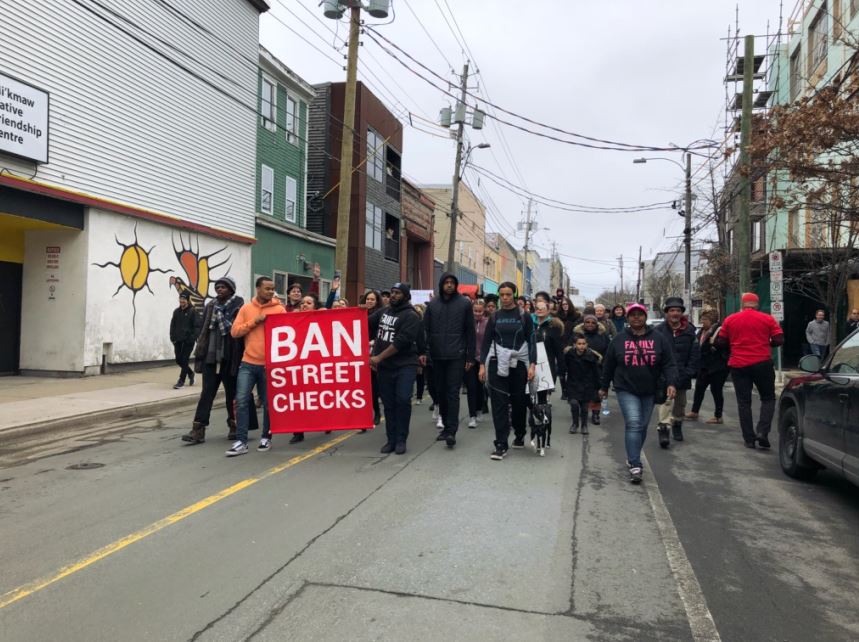The executive director of Elizabeth Fry Society of Mainland Nova Scotia says a lack of critical training is one of the main factors contributing to the overrepresentation of Black and Indigenous people in the justice system.

Emma Halpern’s comments to provincial politicians Tuesday were backed up by the “troubling trends” that the organization, which works with and on behalf of women in conflict with the law, has observed and recorded.
READ MORE: N.S. appoints team to lead justice reform, drive anti-racist policy change in Nova Scotia
In the last five years, she said the organization is seeing an increase in Indigenous and African Nova Scotia people, who make up 40 per cent of those using their services and programming.
“We’re seeing an increase of clients from rural communities,” said Halpern at the Community Services Committee Proceedings, which discussed the overrepresentation of Black and Indigenous people in the justice system.
She attributes this increase to the lack of services surrounding mental health, addiction and LGBTQ2 supports in rural areas. Another significant issue is the lack of transportation that would allow people to get to the types of supports they need.

Over the last few years, Halpern said they’re also seeing high numbers of Black and Indigenous girls engage in the organization’s programming around trafficking exploitation.
“We see the criminalization of trauma and victimization…that is when police arrive, for example, on scene when there is an issue that has occurred we see young women and girls being identified as part of the “problem”….rather than recognizing their tremendous victimization and trauma,” she explained.

Get breaking National news
After going through the issues contributing to the increase, Halpern said that moving forwards a massive increase of mandatory training is needed for police, medical professionals and social workers in anti-racist, trauma informed training and a focus on culturally safe addictions program and housing supports.
READ MORE: Nova Scotia invests $360K in housing facility for criminalized women transitioning back to society
Halpern said there is also a need for accountability mechanisms among social workers, health professionals and police to ensure that this kind of education is taken seriously and internalized.
The executive director of African Nova Scotia Decade for People of African Descent Coalition, who was also present at the committee, said the issues we’re seeing in the criminal justice system are a direct result of the fact that systematic racism exist.
“If systematic racism is the problem, anti-racism seem to be the cure,” said Robert Wright.
He said the coalition’s greatest disappointment is that the systems responsible for the welfare of Nova Scotians have a disappointing record in demonstrating their commitment to anti-racism.
He gives an example to highlight this by speaking about the Wortley report that was published in March 2019.

The report detailed how African Nova Scotians were five times more likely to be stopped and street-checked by police than the general population.
“It was only after a couple of serious advocacy (efforts) that the report was commissioned and so African Nova Scotians and many others were talking about the effects of street checks and questioning the very legality of the practice,” said Wright. “But government did not aggressively pursue our concerns”
But even when street checks got eradicated after much advocacy, Wright said the department of justice still delivered a directive to police around what to do on the streets instead of street checks.
“We, as the African Nova Scotian community still believes that creates a practice of policing that is fundamentally illegal and so here we are without having a collaborative ability to work with government to figure out how best to address this issue.”
READ MORE: Data gap — Governments don’t track how many inmates have been in care
To address the lack of collaboration and the issue of systematic racism, Wright said the coalition has launched the African nova Scotian Justice Institute, which is a comprehensive program to address systematic Black racism in the criminal justice system.
He said the coalition has also advanced the proposal of an African Nova Scotian policing strategy, which aims to look seriously at policing and come up with collaborative ways to address anti-Black racism and policy, but have yet to hear back from the province on how willing they are to support the initiative.
Wright also shared Halpern’s sentiment that critical training is important, but said that the challenge is that training is voluntary and that means certain amount of effort is needed to encourage people to undergo it.
“The training shouldn’t only be about understanding the history and the background…but to acknowledge the historical role police have had to enforce racist policies,” said wright.
“The training must give some tools to police to practice differently,” he added.
The deputy minister at the department of justice, Candace Thomas, said one of her main priorities is to engage with the African Nova Scotia Decade for People of African Descent Coalition on its proposal of having an African Nova Scotian policing strategy.
“It’s certainly of high importance to our department,” Thomas said.
She acknowledged that Nova Scotia has “long and painful history” of anti-Black and anti-Indigenous racism, and that much remains to be done.








Comments